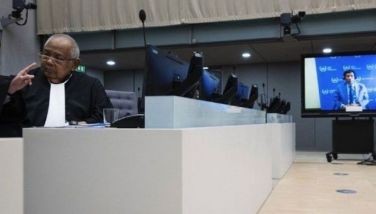'Extreme caution'
A number of businessmen have expressed their frustration over the situation that some have described as “paralysis by analysis” that has resulted in inaction due to the incessant review — if not undoing — of previously approved contracts. While no one will argue against the cleaning up of corruption in government, the fact is — the overly cautious bureaucracy has resulted in almost no movement at all.
I understand where the Makati Business Club is coming from when it said government has to accelerate spending “even sometimes at the risk of some corruption creeping in” — a very pragmatic view that corruption in this country cannot be eradicated overnight. The MBC however was quick to clarify that it does not condone corruption; rather, the statement was an acknowledgment that projects may not be totally corruption-free, but that should not be a reason for government to be immobilized into inaction.
The “straight path” dictum is a noble objective. But government has to consider the apprehension of businessmen about the slow pace of development in the approval of contracts. Infrastructure projects are critical in pump priming the economy because they drive economic growth, especially with peripheral benefits such as job creation — which in turn help Filipinos cope with the difficulties associated with extreme poverty.
We were told about the alleged “bottleneck” at the Energy Department in renewing service contracts that have been at a standstill for months. A few months ago, the DOE announced the possible cancellation of service contracts previously awarded because these were found to be non-compliant. Nonetheless, such cancellations mean further delays because the “compliant” service contracts will have to be offered again with new bidding to be conducted. Luckily, I saw Secretary Rene Almendras at a function the other night and he explained that they were merely sorting out the 230 or so service contracts signed by the previous administration, making sure they are clean and not a duplication of the other contracts.
Businessman Bert Lina — the man who recommended Lito Alvarez as Customs commissioner — admitted to me that the former BOC chief was under so much pressure to achieve the agency’s high revenue target. Even newly appointed BOC chief Ruffy Biazon knows the difficulty of hitting revenue targets, which is why he is asking for more realistic targets to be set next year. In retrospect, it was a difficult balancing act for Lito Alvarez to clean up an agency perceived to be one of the most corrupt in government and at the same time hit his collection quota. We’re not saying that everyone in BOC is corrupt, but it’s an open secret that corruption has become institutionalized with agents and collectors conniving with smugglers and unscrupulous businessmen who are well entrenched in the Customs bureau. And even if the people at the top are clean, it’s a Herculean task to ferret out the rotten apples at the bottom of the basket. Since these employees are protected by the Civil Service Code, it’s not easy to remove them, unlike appointees who can simply be fired or asked to resign. Besides, these people will protect and cover up for each other, unwilling to let go of a lucrative “sideline” — and powerful enough to sabotage anyone who won’t go along with the “system” — the way Lito Alvarez did not.
Not surprisingly, economists have expressed their concern at the slow pace of infrastructure spending by the Aquino administration, saying this would inevitably hurt the economy. Aside from the unending contract reviews and reconfigurations, the bidding postponements as well as suspicions that some old-time suppliers are being given preferential treatment have all contributed in the delay of important projects. Add to that the recent government “rigodon” as seen in the “firing and hiring” of appointees.
But what many find disconcerting is the sudden resignation of Philamer Torio, executive director of the government’s Public-Private Partnership Center, even before the agency becomes fully operational. The PPP Center is supposed to be a flagship of the Aquino administration that would help attract private investors — something like a clearing house for all public-private infrastructure projects that are up for bidding. Torio’s resignation is perceived as a signal that something is seriously amiss with the government’s plan for infrastructure development given the fact that only one out of the planned big-ticket projects has been up for bidding.
This was followed by the recent announcement of DOTC Secretary Mar Roxas that government may junk the PPP scheme and opt for Official Development Assistance as funding source. Mar calls the new plan a “hybrid PPP program” seen to put an end to the so-called “sweetheart deals” undertaken by the past administration where private firms are guaranteed enormous profits at the expense of the Filipino taxpayer. This objective is laudable but time is running out. Christmas is coming and almost two years have already gone by for this administration. While P-Noy still enjoys a very high credibility rating, people want to see more tangible concrete movements in their government. Saving money from the clutches of corruption and putting it into the cash transfer program to benefit the poor is only a stopgap measure.
All Filipinos whether yellow, green, red or blue share the vision of P-Noy about treading the straight path, and do realize that the road is full of potholes that can hinder government from moving forward. But “extreme caution” can also be the biggest stumbling block in realizing that vision. Many Filipinos may literally need “extreme unction” — not “extreme caution.” Ninoy Aquino once said, “the Filipino is worth dying for.” Today, it is Noynoy’s turn to “save the Filipino from dying.”
* * *
E-mail: babeseyeview@yahoo.com
- Latest
- Trending






















